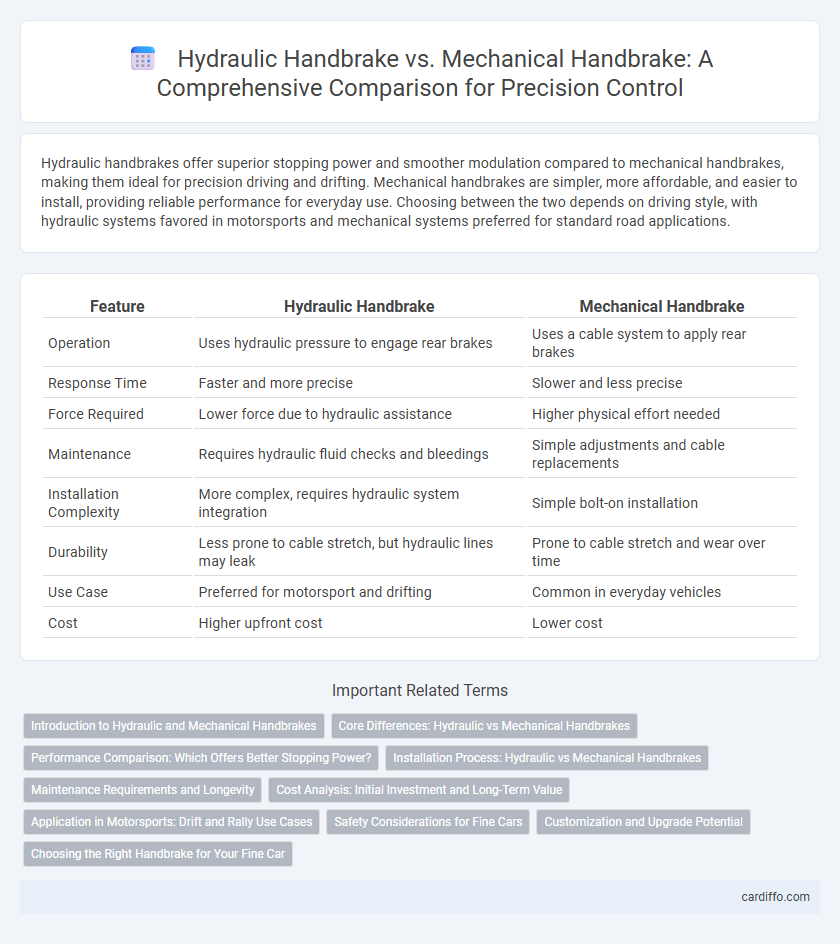Hydraulic handbrakes offer superior stopping power and smoother modulation compared to mechanical handbrakes, making them ideal for precision driving and drifting. Mechanical handbrakes are simpler, more affordable, and easier to install, providing reliable performance for everyday use. Choosing between the two depends on driving style, with hydraulic systems favored in motorsports and mechanical systems preferred for standard road applications.
Table of Comparison
| Feature | Hydraulic Handbrake | Mechanical Handbrake |
|---|---|---|
| Operation | Uses hydraulic pressure to engage rear brakes | Uses a cable system to apply rear brakes |
| Response Time | Faster and more precise | Slower and less precise |
| Force Required | Lower force due to hydraulic assistance | Higher physical effort needed |
| Maintenance | Requires hydraulic fluid checks and bleedings | Simple adjustments and cable replacements |
| Installation Complexity | More complex, requires hydraulic system integration | Simple bolt-on installation |
| Durability | Less prone to cable stretch, but hydraulic lines may leak | Prone to cable stretch and wear over time |
| Use Case | Preferred for motorsport and drifting | Common in everyday vehicles |
| Cost | Higher upfront cost | Lower cost |
Introduction to Hydraulic and Mechanical Handbrakes
Hydraulic handbrakes use fluid pressure to engage the braking system, providing more precise and immediate control often favored in drifting and rally driving. Mechanical handbrakes operate through a direct cable linkage, offering a simpler and more cost-effective solution commonly found in everyday vehicles. Understanding the differences in responsiveness and installation helps drivers choose the appropriate handbrake for their driving style and vehicle setup.
Core Differences: Hydraulic vs Mechanical Handbrakes
Hydraulic handbrakes use brake fluid to transfer force from the lever to the calipers, providing smoother and more precise braking control compared to mechanical handbrakes, which rely on cables to mechanically engage the rear brakes. Hydraulic systems offer faster response and stronger stopping power, ideal for drifting and motorsport applications, while mechanical handbrakes are simpler, more cost-effective, and easier to install and maintain. The core difference lies in the method of force transmission--fluid pressure versus cable tension--impacting performance, feel, and reliability.
Performance Comparison: Which Offers Better Stopping Power?
Hydraulic handbrakes provide superior stopping power due to higher and more consistent clamping force, enabling quicker and more controlled vehicle stops compared to mechanical handbrakes. The direct fluid pressure in hydraulic systems reduces cable stretch and friction losses, resulting in enhanced brake responsiveness and reliability under intense driving conditions. Mechanical handbrakes, while simpler and less expensive, often suffer from cable tension inconsistencies, limiting their overall performance and effectiveness in precise stopping scenarios.
Installation Process: Hydraulic vs Mechanical Handbrakes
Hydraulic handbrakes require a more complex installation process involving bleeding the brake lines to ensure proper fluid pressure and connection to the master cylinder, while mechanical handbrakes are typically easier to install because they rely on a cable system attached directly to the rear brakes or a drum.Mechanical handbrakes often require adjustments for cable tension and alignment, whereas hydraulic handbrakes demand precise hydraulic line routing and secure fittings to prevent leaks.Choosing between hydraulic and mechanical handbrakes depends on vehicle compatibility and the installer's familiarity with hydraulic brake systems versus straightforward cable mechanisms.
Maintenance Requirements and Longevity
Hydraulic handbrakes require regular bleeding and inspection to prevent fluid leaks and maintain optimal braking pressure, ensuring consistent performance and longer lifespan. Mechanical handbrakes, relying on cables and levers, demand frequent cable tension adjustments and lubrication to avoid rust and wear that can compromise functionality over time. Proper maintenance extends the durability of both systems, but hydraulic setups generally offer greater longevity when properly serviced due to fewer mechanical wear points.
Cost Analysis: Initial Investment and Long-Term Value
Hydraulic handbrakes typically have a higher initial investment due to more complex components and installation requirements compared to mechanical handbrakes, which are simpler and more affordable upfront. Over time, hydraulic handbrakes offer enhanced durability and performance, potentially reducing maintenance costs and improving long-term value despite the higher initial expense. Mechanical handbrakes may incur more frequent repairs and adjustments, possibly increasing long-term expenses and lowering overall cost-effectiveness.
Application in Motorsports: Drift and Rally Use Cases
Hydraulic handbrakes provide superior modulation and quicker response, making them ideal for drifting where precise control over rear wheel lock-up is essential to initiate and maintain slides. Mechanical handbrakes, while simpler and more reliable, offer less precision, often favored in rally applications for their durability and ease of repair under harsh conditions. Drift drivers prioritize hydraulic systems for nuanced inputs, whereas rally drivers may prefer mechanical setups for consistent performance on varied terrains.
Safety Considerations for Fine Cars
Hydraulic handbrakes provide more consistent and powerful stopping force than mechanical handbrakes, enhancing safety in fine cars where precise control is critical. Mechanical handbrakes rely on cable tension, which may degrade over time and reduce effectiveness, whereas hydraulic systems use fluid pressure for reliable performance under demanding conditions. Fine cars benefit from hydraulic handbrake systems by ensuring quicker response times and minimizing the risk of brake failure during emergency maneuvers.
Customization and Upgrade Potential
Hydraulic handbrakes offer superior customization and upgrade potential compared to mechanical handbrakes due to their adaptable fluid pressure system, allowing fine-tuning for different driving styles and vehicle setups. Mechanical handbrakes have limited customization options, relying primarily on cable tension adjustments and hardware replacements. Enthusiasts favor hydraulic systems for their modular components and compatibility with aftermarket upgrades, enabling precise control and enhanced performance.
Choosing the Right Handbrake for Your Fine Car
Selecting the ideal handbrake for your fine car depends on performance needs and driving style, with hydraulic handbrakes offering superior precision and quicker response for drifting and motorsport applications. Mechanical handbrakes provide simplicity, easier maintenance, and reliability, making them suitable for everyday driving and classic vehicles. Prioritize factors such as installation complexity, maintenance, and braking efficiency to ensure optimal control and safety during operation.
Hydraulic handbrake vs Mechanical handbrake Infographic

 cardiffo.com
cardiffo.com